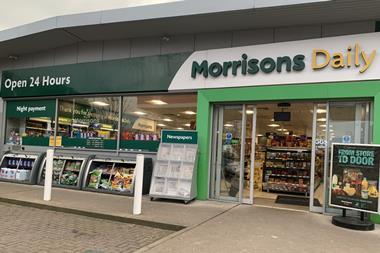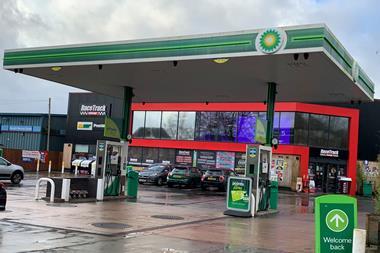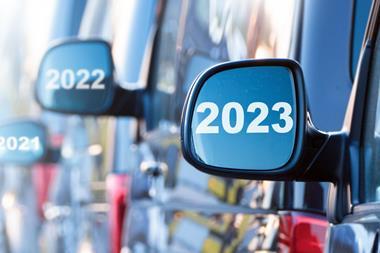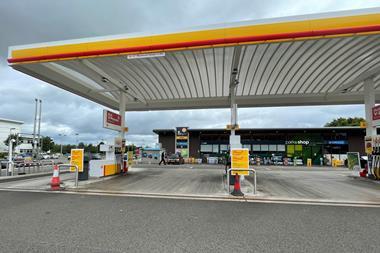Chaos took hold on Britain’s forecourts last month as motorists followed confusing advice issued by government ministers to keep their tanks topped up, with one even suggesting using jerry cans.
The warnings were issued in the wake of the Unite union announcing its tanker driver members had voted for strike action. Queues got so bad in some areas that forecourts were temporarily closed by police.
The panicking motorists sent fuel demand surging to unsustainable levels within a few days.
Fuel polling data for independents revealed volume uplifts against the previous week were as much as 375.9% for super diesel, according to RMI Petrol. Diesel volume estimated average UK daily demand of 68m litres was up 76.8%, while unleaded 55m litres a day rose by 171.8%, and 358.1% for super unleaded.
Mark Wilson, operations manager at Oxfordshire-based Fraser Retail, compared the situation to the last major fuel crisis more than a decade ago.
"This is as bad as 2000 and we’ve not even had a strike yet," he said. "It’s manic but we’ve been well supported by BP. We’re ordering lots more we’re taking double the number of tankers than usual. BP has been able to fulill our orders to make sure we don’t run dry, so we haven’t had to ration fuel. We’re not fully stocked because we’re selling fuel as quickly as we get it.
"Some sites are seeing as much as a 60-70% uplift in volume and that’s getting higher as the competition around us runs out. Supermarkets are running dry and that’s a marketing opportunity for us to showcase our business. Some people say it’s a crisis I say it’s an opportunity!"
John Mason, managing director at Peregrine Retail, said on Thursday: "We’re doing very well and not running out of fuel. Everyone else around Ringwood ran out it became much busier for us. Normally we do about 15-16,000 litres a day, but sold 40,000 litres yesterday. We’re already over that today, and we’ve not even hit our busy time. We’ve been helped by others running out.
"We’re ordering a full load a day. We’ll try to stay as fully stocked as we can be if ultimately the drivers go to strike. BP has their own delivery drivers but they won’t cross the picket line, so we’ll have to wait and see. A lot of the commotion is just motorists panicking. There could be a strike in the next 28 days, and the union has to give seven days’ notice, so it’s all a bit daft. We had people queueing on the road since 6am this morning and it was the same yesterday. I wouldn’t consider rationing because that would get so complicated and cause even more confusion."
Another retailer, who wanted to remain anonymous, said he had avoided running dry by sourcing an interim delivery from a local independent fuel supplier.
"All the garages nearby ran out and although we had a delivery from our oil company scheduled, it would have come too late so we would have run out if I hadn’t got an additional delivery from an independent supplier."
Andrew Owens, chief executive of Greenergy, which supplies 10bn litres of road fuels in the UK, said: "We have seen a very significant uplift in sales which began on Tuesday (March 27) and continued for the next few days. We have been working flat out to maintain stock levels at our customers’ sites. But we don’t believe the current hike in demand is sustainable it’s likely that demand will drop off once the public’s cars are full."
Martyn Ward, commercial director at grocery wholesaler Palmer and Harvey, which supplies up to 70% of UK petrol stations, said: "The fuel supply in many areas of the UK is already at breaking point. A strike could be the last straw for motorists already hit by the double whammy of record fuel prices and petrol station shortages. Our Forecourt Report 2011 showed a dramatic decrease in the number of petrol stations over the past 20 years, from 21,000 to fewer than 9,000. Over the same period the number of cars on the road increased 50% to 31 million. Areas of Britain were already in danger of becoming fuel deserts before the threat of the upcoming petrol strike.
"Communities in the south east have been worst affected in Berkshire there is just one petrol station for 4,111 cars. The result is that many motorists are struggling to find anywhere to fill up, leading to a 40% increase between January and June 2011 in fuel-related call-outs as motorists run out of petrol, according to research by Green Flag."
A spokesman at Top 50 Indie Euro Garages said: "We have seen footfall to our sites significantly increase over the past 36 hours with drivers breaking normal routines and filling-up more than usual. The business is continuing to trade as normal as all of our sites are well-stocked and none are currently closed. The government has already announced that contingency plans are in place and if these come into effect our main supplier BP will follow these as necessary. We will continue to monitor the situation for any new developments and will respond accordingly if there is any change in our position."
timeline of events
l Sunday March 25: The government revealed that emergency plans had been drawn up for army drivers to deliver fuel to petrol stations in anticipation of a possible strike by tanker drivers.
l Monday March 26: Tanker drivers voted in favour of strike action, sparking feelings of shock and surprise among petrol retailers.
l Tuesday March 27: Retailers were already reporting fuel shortages as motorists started panic-buying. Many retailers were seeing a 10-100% increase on normal fuel purchase levels, according to RMI Petrol.
l UKPIA stressed that its members give high priority to safety issues within the industry, in the wake of criticism by the Unite union following a ballot in which tanker drivers voted for strike action.
l RMI Petrol issued a guidance note warning that retailers needed to undertake a formal risk assessment before permitting access to any new third-party tanker drivers.
l RMI Petrol chairman Brian Madderson spoke out in condemnation of the Department of Energy & Climate Change (DECC) for its "complete lack of engagement with industry" in the lead-up to the Unite ballot results.
l Chaos on Britain’s forecourts continued as motorists followed confusing advice issued by government ministers to keep their tanks topped up, with one even suggesting using jerry cans.
l Friday March 30: Fuel polling data for independent retailers across the country revealed that volume uplifts against the previous week were as much as 375.9% for super diesel. Diesel volume was up 76.8%, unleaded rose by 171.8%, and 358.1% for super unleaded.
l A tanker driver’s blog put declining safety standards and working conditions firmly at the heart of the dispute.
l Unite ruled out Easter strike action by tanker drivers in a bid to focus on substantive talks through Acas.





























No comments yet